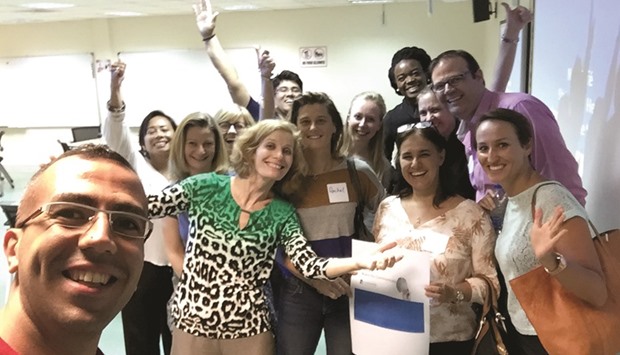In his book, Emotional Intelligence: Why It Can Matter More Than IQ, psychologist Daniel Goleman talks about how “in a very real sense”, we have two minds — one that thinks and one that feels. “Life is a comedy for those who think and a tragedy for those who feel,” he writes.
Emotional intelligence or Emotional Quotient (EQ) is essentially the ability to identify and manage your own emotions and the emotions of others, but it is often neglected by most of us despite its profound influence on our lives. At the free workshop titled EQ Conversation Cafe Doha: State of the Heart 2016, at the University of Calgary in Qatar, last week, a curious bunch turned up to learn more about the significance of EQ, its current state in the world, and the relationship of EQ to successful outcomes, among other things.
Tracking global EQ trends since 2011, the State of the Heart reveals insights about global trends in emotional intelligence, including EQ and performance, and EQ at school and home. The workshop helmed by Marilyn Harris taught the participants the essential skills for career success, ways to identify important talents and how we can apply them.
Harris, who volunteers as a Network Leader for Six Seconds, a non-profit organisation that teaches emotional intelligence to enable individuals, teams, organisations and families flourish (www.6seconds.org), hosts EQ Cafes about four times a year. “These are opportunities to improve and practice emotional intelligence,” Harris tells Community, soon after spearheading another successful EQ workshop. “The next Cafe will be on Tuesday, December 6, from 6.30pm to 8pm. While these are free events, those interested must register by visiting the Six Seconds website under upcoming events.”
The term ‘emotional intelligence’ means ‘being smart with feelings’, says Harris. “Emotions are data — they are messages in our brains and bodies that give us signals about how we are perceiving risks and opportunities,” Harris explains. “Emotional intelligence is a learned set of skills that allows people to accurately and skilfully use their feelings and thoughts to take effective action. Emotional intelligence is crucial to our personality development because by being smart with our emotions we can better understand ourselves, which in turn helps us to have more fulfilling relationships with others. Getting along with others both personally and professionally is one of the key factors for living a happy life.”
As for the increasing relevance of EQ, Harris says it matters all the more in today’s times because with our demanding and stressful lives, those with EQ are able to experience “a higher degree of physical and emotional well-being”. Harris says, “Key characteristics of emotionally intelligent people are that they are able to recognise their own feelings such as joy, sadness, anger and happiness. People with evolved EQ also tend to be more motivated, optimistic, better able to make decisions, have a greater sense of purpose, and are more empathetic towards others.”
And how can an organisation benefit if their employees have high EQ? “EQ matters in organisations because it helps us to be better communicators which among many factors can help us to improve motivation and relationships including customer service. In fact, people who have above average emotional intelligence are 43 times more likely to score as ‘high performers.’ This is according to the latest State of the Heart report which is research done by Six Seconds,” Harris explains. “One of the best things about emotional intelligence is that it is learned and we can all improve. EQ is linked to key success factors in life including positive relationships, effectiveness, well-being and quality of life.”

TURNING
